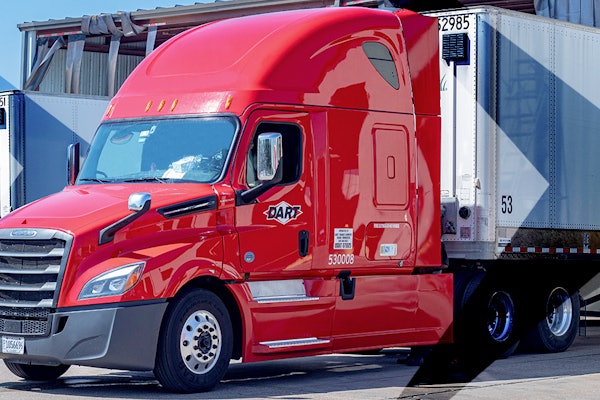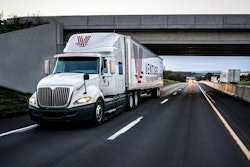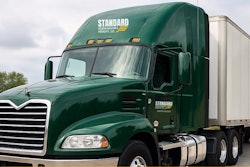The Department of Transportation last month proposed legislation to enhance the inspection and oversight of hazardous materials transportation in various modes, including trucking.
Although the proposal was already under development before Sept. 11, it was expedited after the FBI and others uncovered evidence that terrorists might be planning to use hazardous materials shipments as weapons of mass destruction. Law enforcement officials, for example, suspected that a conspiracy a couple of years ago to obtain fraudulent commercial driver’s licenses with hazmat endorsements may have been part of a terrorist plot.
The proposal Transportation Secretary Norman Mineta sent to Congress is designed to deal with a range of hazmat issues and is far from just an anti-terrorism initiative. In an analysis of the proposals, the DOT noted that in the 1990s it received reports of some 3,300 cases of leaks of undeclared hazardous materials resulting in 110 deaths and 197 injuries. The department said this understates the real picture because up until recently intrastate trucks did not have to report such incidents. It also notes that the reports represent only a small portion of the total undeclared or hidden hazmat shipments.
The proposal would also boost penalties for carriers violating hazmat exemptions or special permits from the current $27,500 to $100,000 per violation on the civil side, and up to 20 years in prison plus a fine on the criminal side. The current maximum prison term is five years.
Some elements of the proposal will be particularly helpful in combating malicious transportation of hazardous materials. It would give an inspector the authority to prevent a truck driver who is hauling an illegal hazmat shipment from continuing on with an illegal load. Another provision would end ignorance of the law as an excuse for carrying an illegal hazmat shipment – a change the DOT says is essential for federal prosecution of terrorists using trucks for their deadly activities.
CDL security
Meanwhile, in light of the disclosures over fraudulent CDLs, the Federal Motor Carrier Safety Administration said it plans to issue an advance notice for a rulemaking to require drivers to carry biometric identifiers to make it harder to forge or sell a fraudulent CDL. Such identifiers would be unique to the person holding the CDL and could be easily checked.
The challenge is to find a fool-proof identifier that could not be forged, says FMCSA safety chief Julie Cirillo. “There’s some difficulty with replication of a variety of medical identifiers,” she told reporters outside of a Senate Commerce Committee hearing on truck and bus security last month. “We are trying to hone in on those that are not easily replicated,” she said. Among potential biometric identifiers are retina scans, thumbprints, digital photographs and signature or voice recognition devices.
Cirillo also says FMCSA is considering ways to check drivers’ backgrounds to try to prevent a would-be terrorist from getting a license, job or rental truck. The check would be “more a documentation issue than a criminal issue,” she said.
FMCSA also is reviewing how it can work with the FBI and Immigration and Naturalization Service to ensure that CDL applicants and job-seeking drivers have not entered the country illegally. “It’s a matter of making sure that credentialing and documentation is correct, and that people have valid green cards, have valid visas and those type of issues,” Cirillo says.
FMCSA regional and state staffers have been visiting hazardous material carriers to advise them on precautions to take against terrorism and “we’ve been welcomed with open arms” by the carriers, Cirillo says. High-risk carriers are those who carry a large volume of particularly dangerous items, such as explosives, poisonous gas and chlorine.
Truck rental and leasing companies also will be a big target to “heighten their awareness” of the need to check out the person or company that wants to rent a truck. Cirillo points out that Timothy McVeigh used a rental truck to transport the chemicals he used to blow up the Murrah Federal Building.
Industry priorities
At the Senate committee hearing, American Trucking Associations Chairman Duane Acklie called for legislation to allow motor carriers access to the FBI national crime information databases to allow the companies to get complete information on current and prospective employees. Acklie also called for tougher measures to fight cargo theft, including greater penalties, mandatory theft reporting requirements and more money for federal and state enforcement efforts.
At the borders, Acklie urged the development of new technology to help enforce and speed cross-border traffic, including the so-called International Trade Data System being developed by the Customs Service. Under that system, carriers submit standard electronic data records though a single federal gateway, where the information would be disseminated to all relevant federal agencies before the shipments reach the borders.
ATA also urged tougher rules regarding hazmat CDL endorsements, with more oversight of CDL testers in the states and increased funds for state licensing agencies, along with the greater sharing of drivers’ social security numbers among state and other officials.
Cirillo told the committee that FMCSA also is concerned with third-party CDL testers and examiners, who have been found guilty of fraudulent activities in several cases. The agency is urging the states to consider changes to tighten control.
Massachusetts State Police Lt. Paul Sullivan, president of the Commercial Vehicle Safety Alliance, called for the use of electronic freight bills for better information sharing on cargo shipments and for on-board vehicle systems to help track vehicles plus sensors to identify potential security breaches en route.







